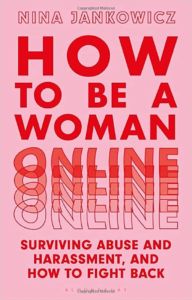Online Womanhood
Posted By Morris van de Camp On In North American New Right | Comments DisabledNina Jankowicz
How to Be a Woman Online: Surviving Abuse & Harassment, & How to Fight Back
New York: Bloomsbury Academic, 2022
Womanhood is under threat. The effects of this society-wide attack on girls can be seen in young ladies “transitioning [2],” being encouraged to serve in the military [3], and vicious online attacks on women by trolls. One such woman attacked by trolls online is Nina Jankowicz [4]. Jankowicz is an expert on Internet disinformation [5], with a focus on Russian aggression in Eastern Europe [6].
Recently Jankowicz was appointed “Disinformation Czar” in the Biden regime. The appointment went badly. The Republicans immediately recognized that a Disinformation Czar would soon be used against them. All of that is true, but disinformation is actually a real thing. Foreign governments — Israel, Saudi Arabia, Russia, and China among them — routinely work to misinform the American public. It is certain that the Israeli government worked with Jewish lobbyists, neoconservative ex-Trotskyites [7], and the George W. Bush administration to spread disinformation on Iraq’s “weapons of mass destruction” to get Americans into a war to further Israeli interests [8].
I personally found Jankowicz’s ideas about disinformation very compelling. As a white advocate, I wish to spread the word about the bright possibility of a future American white ethnostate. To be successful, I must be on the side of truth. I cannot defend a position that can be proven wrong. I’m even careful about advocating for or against a thing — such as a new medical advance — when I don’t know what to believe.
Nonetheless, Jankowicz is a woman activist. Although she is an Establishment Democrat, her problems are not unlike those of other female activists for other causes, such as Anita Bryant [9]. Jankowicz is being attacked for her womanhood more than for her ideas, good or bad. Jankowicz’s insights into dealing with these attacks are important for our own women activists to follow.
The basics
There is a known way to avoid online harassment: Don’t have a social media account where one can interact with the entire suite of users. One can be an activist with a website where comments are carefully weeded out, and a random reader can only contact the people behind it through a contact form.
Nina Jankowicz did none of that. By her own account, she adopted Facebook early and started to blog immediately. As she increased in prominence, she started to gain followers. Some of those followers were odd, with a one-sided relationship with her.
Jankowicz offers this very important, but basic, advice to others to protect themselves from problems online:
- Practice basic cyber hygiene. Don’t have your password in a location where it can be easily seen. Representative Mo Brooks took a photo of his workspace that showed his e-mail address and PIN number and posted it to Twitter.
- Use a password manager. That way only one password is needed to access the manager, and each password should be different from the others and strong. Password managers can also inform the user of data breaches and other problems.
- Use two-factor authentication. This means that a user logs in to a website using a password, and then the website sends a number to the user’s device. A potential hacker must have the password as well as the device to get into a potential victim’s account.
- Use encrypted e-mail communications. This way, one’s e-mail cannot be seen by any other party. There are several e-mail services and applications that can do this.
- Use an anti-doxing service. A user can pay a company to remove any and all of his private information from the Internet. It can be a yearly cost, but it may be worth it.
Other online best practices include:
Don’t post photos of your location in real time.
Don’t share photos of your residence, or in the vicinity of your residence.
Don’t post photos of your pets in which their identity tags containing your phone number are visible.
Don’t share anything about your life that might relate to your online account security, such as your mother’s maiden name.
Don’t get taken in by people on dating sites.
The attention women get
Jankowicz is frequently on television, usually discussing disinformation about Eastern Europe. Once she makes an appearance, a great many men then start following her on her social media accounts. These followers are the male version of groupies.
 [10]
[10]You can buy Greg Johnson’s Confessions of a Reluctant Hater here
From Jankowicz’s perspective, they come in several groups. There are men seeking a response from an attractive young woman such as her; there is usually something sexual about their interest. Then there are messages seeking basic information about her, despite the fact that people could discover this through their own research. There are also older men who write in ALL CAPS. This is apparently common enough to rate a category.
Jankowicz keeps her direct messaging functions open so that she can receive important leads and engage with people in her field, but that means she is also subject to dick pics, abusive private messages, and other outrages.
There are some methods she has learned to protect herself, however. First, block trolls. Second, mute your social media account. You will still be connected to your followers, but you won’t receive notifications about their posts or messages. Jankowicz also argues that one should always read the Terms of Service (ToS) of the various social media sites. It could be possible that an abusive troll is violating the ToS and can therefore be removed. And lastly, threats of violence should be taken seriously.
If you think you may need to contact the police about someone who is communicating with you online, save every threating message. Also remember that although you might delete messages, the other party can save them. It is possible to delete messages or entire conversations on some messaging apps, but they can still be preserved by the person at the other end with screenshots. Thus, there isn’t any surefire way to entirely delete a tweet. And always be careful with what you say online, since offhand statements can get you fired. The firing may be unjust, but you’ll still be out of a job.
Jankowicz argues that women should seek out other ladies in their field to gain support and encouragement. These circles can likewise be places where good ideas can be exchanged.
How to be a Woman Online is a quick read. It offers outstanding advice for female activists of all stripes. The Internet is a two-edged sword: It can bring a person fame, it can illuminate important truths, it can allow one to connect with a large network, but at the same time, one is entering a battlefield. Be careful online.
* * *
Counter-Currents has extended special privileges to those who donate $120 or more per year.
- First, donor comments will appear immediately instead of waiting in a moderation queue. (People who abuse this privilege will lose it.)
- Second, donors will have immediate access to all Counter-Currents posts. Non-donors will find that one post a day, five posts a week will be behind a “Paywall” and will be available to the general public after 30 days.
- Third, Paywall members have the ability to edit their comments.
- Fourth, Paywall members can “commission” a yearly article from Counter-Currents. Just send a question that you’d like to have discussed to [email protected] [11]. (Obviously, the topics must be suitable to Counter-Currents and its broader project, as well as the interests and expertise of our writers.)
To get full access to all content behind the paywall, sign up here:
Paywall Gift Subscriptions
 [12]If you are already behind the paywall and want to share the benefits, Counter-Currents also offers paywall gift subscriptions. We need just five things from you:
[12]If you are already behind the paywall and want to share the benefits, Counter-Currents also offers paywall gift subscriptions. We need just five things from you:
- your payment
- the recipient’s name
- the recipient’s email address
- your name
- your email address
To register, just fill out this form and we will walk you through the payment and registration process. There are a number of different payment options.
